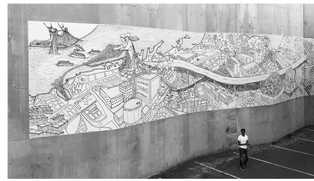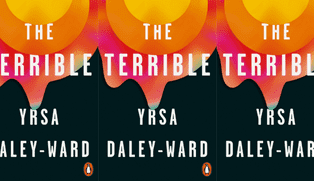In 1981, on a frosty January night, there was a house party at 439 New Cross Road. Yvonne Ruddock, a young black girl just turned 16 and on the cusp of womanhood, was the party’s host and celebrant. The house reverberated with the bass of the sound system playing tune after tune. Cups flowed with mixes of rum and coke. It was joyous. It was sweaty. Or at least we imagine so. Ruddock and 12 of her friends, all young and black, perished that night in a fire that burned until the next morning. The aftermath of the tragic event, namely the police’s complacency and media’s silence, sent a jolt of anger, and the impulse to protest, through the local New Cross community. It is this energy that is central to Surge, Jay Bernard’s performance piece of their latest book of poems of the same name, currently showing at The Albany in Deptford.
Surge opens with language like scripture. It is as if we are being ushered into a ceremony, a sacred meditation on the reality of a people – black and immigrant – whose histories and homes are forever inextricable from British influence. Bernard’s verse evokes the weight of a spiritual presence, their cadence so light on the ears one might gloss over the truth of its content: “ we were brought here… that we might be named, numbered, and forgotten.” This opening is a kind of mourning. This, after all, is a performance about the dead, and the spectre of the divine, of otherworldly spirits not quite at rest which weave in and out of the auditory and physical space. Mijke Van Der Drift’s lighting design is spectacular in shaping the latter, in one particular moment drenching Bernard in the red of a bloody, neon blaze, in another casting shadows so multiple it was as if the stage was peopled with more than just the one body.

This effect was heightened by the set’s design; Bernard has an expanse of bare, barren space to move in, enclosed by a semi-circle of identical protest placards on one side and the audience on the other. They make real use of this space and its dimensions, lying almost prostrate on the floor, joining on to a large sound system in the corner, and throughout, dancing. Bernard dances a lot; their movement is slick and easy, at once juxtaposing the joy in ragga-backed celebration with the heavy grief forever cemented to this particular party’s end.
Throughout the performance, there is a raised screen behind Bernard where images of the victims, of the city, of specific south London streets, are projected apart and spliced together. In some moments, there is the image of Bernard’s taut back with the city projected onto it. Bernard’s movement throughout the piece, and these specific moving images of them, conjure thoughts on the potential of the black body, what it is expected to hold and what, in this city, it has been made to endure. In the latter portion of the performance, Bernard takes a seat in the audience while we watch a longer video, part storytelling, part self-reflection, where they share more details about the New Cross Massacre, and draw connections between their own body, intentionally altered through surgery, and Ruddock’s. In this moment Bernard, who has spent much of the performance until this point embodying the characters involved in the tragedy, appears most stripped back and vulnerable.

Though just a total of 45 minutes, Surge is packed with powerful moments. Bernard’s employment of language is unsurprisingly masterful, evoking vivid imagery from the mundane to the mystical, breathing life and honour into the legacy of the 13 dead and 27 injured in the New Cross Massacre. The contours of this story, and their relevance to the recent tragedy of Grenfell, are not lost on Bernard or the audience. The reality of government ineptitude, the prevalence of anti-black and anti-migrant sentiment, the frustrating opacity surrounding inquiries and legal proceedings, all show up, tragically recognisable. Surge, both written and performed, is an important documentation of a largely overlooked section of Black British history, and it serves as a reminder not only of the struggles we are yet to overcome, but the inextinguishable power and resilience with which we face them.


%20Joshua%20Virasami.jpg)

